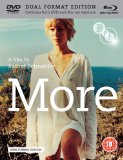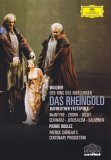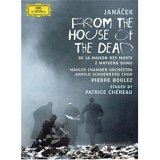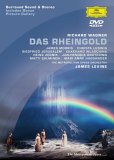 Wagner - Die Meistersinger (Stein, Horst) | DVD | (15/05/2006)
from £19.95
| Saving you £-4.96 (N/A%)
| RRP
Wagner - Die Meistersinger (Stein, Horst) | DVD | (15/05/2006)
from £19.95
| Saving you £-4.96 (N/A%)
| RRP Stage and directed by Richard Wagner's grandson Wolfgang at the Bayreuther Festspiele in 1984 this production of Wagner's only comedy dispenses with the common cliches to reveal the humanity of each character. Here Beckmesser is no longer a foolish caricature but a cultivated intellectual; Stolzing emerges as a thoughtful individual rather than aggressive aristocrat; and Hans Sachs sheds his solemn patriarchal veneer to become a likeable middle-aged man.
 More (DVD + Blu-ray) | Blu Ray | (19/09/2011)
from £16.99
| Saving you £3.00 (17.66%)
| RRP
More (DVD + Blu-ray) | Blu Ray | (19/09/2011)
from £16.99
| Saving you £3.00 (17.66%)
| RRP Barbet Schroeder's (Single White Female, The Valley) dark tale, based on a true story, follows the naive Stefan (Klaus Grunberg) in his pursuit of offbeat American Estelle (Mimsy Farmer) to the island paradise of Ibiza. He leads a seemingly idyllic life with her by the sea - where the scenic beauties and delights of LSD and nude sunbathing are fully revealed by Nestor Almendros' stunning photography - before succumbing to the destructive trappings of heroin addiction.The film is famous for its subdued, moody Pink Floyd soundtrack, featuring some of the band's most spontaneous and eclectic work - including Green is the Colour, Cymbaline and The Nile Song.Extra Features: Dual Format Edition: includes both the Blu-ray and the DVD of the film and the extras. Original trailer Trailers for The Valley and Matresse Interview with Barbet Schroeder Fully illustrated booklet
![Das Boot -- Superbit [1981]](/pictures/1002598.jpg) Das Boot -- Superbit | DVD | (12/05/2003)
from £N/A
| Saving you £N/A (N/A%)
| RRP
Das Boot -- Superbit | DVD | (12/05/2003)
from £N/A
| Saving you £N/A (N/A%)
| RRP Das Boot is a graphic and gripping tale that follows the daring patrol of U-96 one of the famed German U-Boats known as ‘The Grey Wolves’. Prowling the North Atlantic they challenged the British Navy at every turn. The crew abroad the U-96 is portrayed in a desperate life-and-death struggle coping with life beneath the waves quickly gives way to terror when confronting the enemy...
 Wagner - Das Rheingold (Boulez, Mcintyre, Schwarz) | DVD | (11/07/2005)
from £15.04
| Saving you £1.95 (11.50%)
| RRP
Wagner - Das Rheingold (Boulez, Mcintyre, Schwarz) | DVD | (11/07/2005)
from £15.04
| Saving you £1.95 (11.50%)
| RRP In Patrice Chereau's illuminating violent Bayreuth production of Das Rheingold Wotan wears the brocade coat of feudal times while the Rhine seems to be a reservoir with modern-day power station. Yet as Chereau says it could also be many other things ... perhaps a mythological presence the mythology of our time ... The gods' ascent to Valhalla (is) a defiant flight into the future.
 Wagner - Der Ring Des Nibelungen (Boulez) | DVD | (11/07/2005)
from £113.44
| Saving you £-48.45 (N/A%)
| RRP
Wagner - Der Ring Des Nibelungen (Boulez) | DVD | (11/07/2005)
from £113.44
| Saving you £-48.45 (N/A%)
| RRP Working closely with video director Brian Large Chereau re-rehearsed his staging for the films taped at that time to recreate the experience on screen and to preserve career-defining performances from the original cast headed by Donald McIntyre Gwyneth Jones and Manfred Jung.
![The Last Metro [DVD]](/pictures/1131904.jpg) The Last Metro | DVD | (29/09/2014)
from £7.49
| Saving you £8.50 (113.49%)
| RRP
The Last Metro | DVD | (29/09/2014)
from £7.49
| Saving you £8.50 (113.49%)
| RRP François Truffaut again tackles the elusive nature of creativity and creation in his thoughtful, sumptuous 1980 film The Last Metro. Nominated for the Best Foreign Language film Oscar, and a winner of various Césars, The Last Metro is set in occupied France during World War II. Marion Steiner (Catherine Deneuve) manages the Theatre Montmarte in the stead of her Jewish husband, director Lucas Steiner (Heinz Bennent). He has purportedly fled France but is really hiding in the basement of the theatre. The one hope to save the Montmarte is a new play starring the dashing Bernard Granger (Gérard Depardieu). The attraction between Marion and Bernard is palpable, and as usual Truffaut creates tension and drama from even the most casual of occurrences. The theme of the director locked away while his lover and his creation are appropriated by others makes for interesting Truffaut study, but first and foremost this is a well-spun romance.--Keith Simanton, Amazon.com
 Janacek - From The House Of The Dead | DVD | (17/03/2008)
from £6.30
| Saving you £8.95 (177.58%)
| RRP
Janacek - From The House Of The Dead | DVD | (17/03/2008)
from £6.30
| Saving you £8.95 (177.58%)
| RRP Leos Janacek: From The House Of The Dead, performed by various performers and conducted by Pierre Bouelz.
![Edgar Wallace Presents: Coast of Skeletons [DVD]](/pictures/1123916.jpg) Edgar Wallace Presents: Coast of Skeletons | DVD | (11/11/2013)
from £12.98
| Saving you £-1.00 (N/A%)
| RRP
Edgar Wallace Presents: Coast of Skeletons | DVD | (11/11/2013)
from £12.98
| Saving you £-1.00 (N/A%)
| RRP Heading an international cast - including German 'krimi' veteran Heinz Drache - Dam Busters star Richard Todd reprises his role as insurance investigator Harry Sanders in this rare crime adventure based on Edgar Wallace's 1911 novel Sanders of the River. Made in 1964, Coast of Skeletons was the second Sanders adaptation produced and co-written by legendary B-movie mogul Harry Alan Towers, and is presented here in a brand-new transfer from original film elements in its as-...
![Nowhere In Africa [2003]](/pictures/1018785.jpg) Nowhere In Africa | DVD | (29/09/2003)
from £16.79
| Saving you £3.20 (19.06%)
| RRP
Nowhere In Africa | DVD | (29/09/2003)
from £16.79
| Saving you £3.20 (19.06%)
| RRP Based on the autobiographical novel by Stefanie Zweig this is the story of Walter Redlich a Jewish lawyer living in Germany during the Third Reich. He takes his family away from Germany to live on a farm in Kenya but finds that he is not made welcome by the British settlers who live there....
 Mesmer | DVD | (29/01/2007)
from £N/A
| Saving you £N/A (N/A%)
| RRP
Mesmer | DVD | (29/01/2007)
from £N/A
| Saving you £N/A (N/A%)
| RRP Who knows what secrets lurk in the souls of man? In 18th century Vienna one man discovers the truth-and pays the price. His patients call him a miracle worker; his colleagues dismiss him as a quack. Meet Franz Anton Mesmer (Alan Rickman Galaxy Quest Dogma Sense and Sensibility): physician hypnotist self-promoter hopeless romantic and man ahead of his time. Employing revolutionary ideas about ""animal magnetism"" and the power of suggestion Mesmer gains local acclaim by curing his disturbed young cousin. Shortly thereafter beautiful blind pianist Maria Theresa Paradies (Amanda Ooms) seeks Mesmer's aid setting in motion a dizzying doomed love affair as her cure becomes both his greatest triumph and his downfall. In this thought-provoking film from acclaimed screenwriter Dennis Potter (The Singing Detective) and director Roger Spottiswoode (Tomorrow Never Dies) everything we know-or think we know-about the nature of consciousness is called into question. As the man who scandalized Vienna and Paris and threw the medical establishment into an uproar Alan Rickman delivers a tour de force performance that won the Best Actor Award at the Montreal Film Festival. Music composed by three-time Golden Globe Nominee Michael Nyman
![The Serpent's Egg [1977]](/pictures/1017904.jpg) The Serpent's Egg | DVD | (02/08/2004)
from £29.03
| Saving you £-13.04 (N/A%)
| RRP
The Serpent's Egg | DVD | (02/08/2004)
from £29.03
| Saving you £-13.04 (N/A%)
| RRP Abel Rosenberg (Carradine) is a circus acrobat out of work and living in a defeated Germany after the First World War. He takes a job at the Veregus Clinic and there he finds the truth behind the work of the Professor Veregus (Bennett) work that led to his own brother committing suicide...
 Wagner: Das Rheingold -- Metropolitan/Levine | DVD | (14/10/2002)
from £19.99
| Saving you £-3.00 (N/A%)
| RRP
Wagner: Das Rheingold -- Metropolitan/Levine | DVD | (14/10/2002)
from £19.99
| Saving you £-3.00 (N/A%)
| RRP It takes a certain amount of forethought if Das Rheingold is to be more than a series of special effects scenes, though moments like the appearance of the giants through the mist or Alberich's transformations need to be as thrilling as they are here. As always in his Wagner, and perhaps especially in this very traditional 1990 Metropolitan Opera production of the Ring cycle, James Levine keeps to the forefront the underlying humanity of Wagner's gods and monsters. In the first scene, for example, he brings out the thoughtless, callous frivolity of the Rhine maidens as they precipitate the events of the four operas by taunting the gnome Alberich: it helps that they swirl around, green and gold, in a convincing representation of the bottom of the Rhine, but the emotions are the point. Ekkehaard Wlaschiha is a convincingly menacing Alberich partly because Levine brings out his vulnerability as well as his evil temper. James Morris is splendid as the younger less care-worn Wotan and Siegfried Jerusalem as Loge enjoys the sarcasm of his cynical commentary on Wotan's aspirations. The smaller parts have luxury casting: Matti Salminen as Fafner and Christa Ludwig as Fricka, for example. On the DVD: Das Rheingold comes with a photo gallery of the Metropolitan Opera production and with menus and subtitles in German, French, English, Spanish and Chinese. Disappointingly though it is presented in American NTSC format with standard TV 4:3 visual ratio. But it does have an excellent clear acoustic in all three of its audio options: PCM stereo, Dolby Digital 5.1 and DTS 5.1. --Roz Kaveney
 DAS CABINET DES DR CALIGARI (Masters of Cinema) Limited 2-disc Blu-ray SteelBook edition | Blu Ray | (16/01/2017)
from £N/A
| Saving you £N/A (N/A%)
| RRP
DAS CABINET DES DR CALIGARI (Masters of Cinema) Limited 2-disc Blu-ray SteelBook edition | Blu Ray | (16/01/2017)
from £N/A
| Saving you £N/A (N/A%)
| RRP Eureka Entertainment to release DAS CABINET DES DR CALIGARI, Robert Weine's sinister tale of psychosis and murder, set in a warped Gothic landscape, in a Limited Edition 2-disc Blu-ray SteelBook featuring the 2014 documentary From Caligari to Hitler as part of the Masters of Cinema Series on 16 January 2017. One of the most iconic masterpieces in cinema history, Robert Wiene's Das Cabinet des Dr. Caligari shook filmgoers worldwide and changed the direction of the art form. Now presented in a definitive restoration, the film's chilling, radically expressionist vision is set to grip viewers again. At a local carnival in a small German town, hypnotist Dr. Caligari presents the somnambulist Cesare, who can purportedly predict the future of curious fairgoers. But at night, the doctor wakes Cesare from his sleep to enact his evil bidding... Incalculably influential, the film's nightmarishly jagged sets, sinister atmospheric and psychological emphasis left an immediate impact in its wake (horror, film noir, and gothic cinema would all be shaped directly by it). But this diabolical tale nevertheless stands alone - now more mesmerising than ever in this Blu-ray SteelBook edition, along with a bonus Blu-ray disc containing the 2014 documentary From Caligari to Hitler, exploring the social and cultural impact of German Cinema during the Weimar Republic.
![The Death Of Mario Ricci [DVD] [1983]](/pictures/1101482.jpg) The Death Of Mario Ricci | DVD | (12/12/2011)
from £N/A
| Saving you £N/A (N/A%)
| RRP
The Death Of Mario Ricci | DVD | (12/12/2011)
from £N/A
| Saving you £N/A (N/A%)
| RRP The Death Of Mario Ricci (La mort de Mario Ricci)
![Wagner: Siegfried [1976]](/pictures/1028626.jpg) Wagner: Siegfried | DVD | (15/10/2001)
from £N/A
| Saving you £N/A (N/A%)
| RRP
Wagner: Siegfried | DVD | (15/10/2001)
from £N/A
| Saving you £N/A (N/A%)
| RRP  Strauss: Der Rosenkavalier -- Vienna/Kleiber | DVD | (03/09/2004)
from £16.96
| Saving you £-0.71 (N/A%)
| RRP
Strauss: Der Rosenkavalier -- Vienna/Kleiber | DVD | (03/09/2004)
from £16.96
| Saving you £-0.71 (N/A%)
| RRP The epic grandeur of Der Rosenkavalier stems not just from its immense length (over three hours) but from the all-too-human complexity of its characters--each of whom is smitten with someone else--and the endless stream of graceful melodies the composer conjures. After the tonality-stretching dissonance of Salome and especially Elektra, Strauss moved onto a different musical path here: the music's sheer gorgeousness has given this most heartbreaking of 20th-century operas its pride of place in the repertory. For this 1994 performance at the Vienna Opera House, conductor Carlos Kleiber leads a committed reading of the buoyant score that savours every note. The three leads are superb singer-actresses who get full marks for embodying Strauss's most richly romantic creations: Felicity Lott (the Marschallin), Anne Sophie von Otter (Octavian) and Barbara Bonney (Sophie) also offer a truly entrancing final trio, one of the great scenes in all opera. The stereo sound mix is solid, as is the video transfer. --Kevin Filipski, Amazon.com
![More [1969]](/pictures/1012378.jpg) More | DVD | (28/07/2003)
from £N/A
| Saving you £N/A (N/A%)
| RRP
More | DVD | (28/07/2003)
from £N/A
| Saving you £N/A (N/A%)
| RRP Barbet Schroeder made this directing debut in 1969 with this story set in the youth culture of the Sixties. Stefan a young german student hitchhikes to Paris to begin the search for himself with the usual assistance offered by sex drugs and rock'n'roll. At a wild Left Bank party he falls in love with Estelle an off-beat American girl who gives him his first joint. When the pair meet up again in Ibiza it becomes apparent that Estelle is getting deeper and deeper into the drug scen
 Puccini: Tosca -- 2002 Film Version | DVD | (23/06/2003)
from £15.98
| Saving you £9.01 (36.10%)
| RRP
Puccini: Tosca -- 2002 Film Version | DVD | (23/06/2003)
from £15.98
| Saving you £9.01 (36.10%)
| RRP Benoit Jacquot's filmed Tosca treads a fine line between operatic staginess and cinematic contrivance. As per the libretto, each act takes place in a single setting, but with the singers here miming to a pre-recorded soundtrack. Jacquot freely reminds us of the conceit with cutaways to the recording session itself--revealing conductor, orchestra and soloists at work--thus a bridge is made between the on-screen action and the music-making itself, and the inherent duality of any opera production is laid refreshingly bare. The same cannot be said for the director's decision to interpolate spoken dialogue over the music in key places--a distraction not an enhancement. Angela Gheorghiu and Roberto Alagna are glamorous and attractive enough to make the most of their Hollywood-style close-ups; their singing easily bears similar close scrutiny--as anyone who owns the CD soundtrack album will surely already know. If Alagna lacks a little power as Cavaradossi on record, his charismatic screen presence happily compensates; Gheorghiu is both vocally and physically almost ideal as Tosca. Ruggero Raimondi's Scarpia completes an outstanding trio, and in the pit (or, rather, in the studio) conductor Antonio Pappano handles the drama of Puccini's score without missing a single nuance. Both musically and visually, then, this is a Tosca to treasure. On the DVD: Tosca on disc looks vibrant in this warm, widescreen picture accompanied by a DTS 5.1 soundtrack. Three filmed interviews--with Gheorghiu, Pappano and Jacquot--provide some insight into the making of this production. --Mark Walker
![The Lost Honour Of Katharina Blum [Blu-ray] [1975]](/pictures/1094740.jpg) The Lost Honour Of Katharina Blum | Blu Ray | (28/09/2009)
from £N/A
| Saving you £N/A (N/A%)
| RRP
The Lost Honour Of Katharina Blum | Blu Ray | (28/09/2009)
from £N/A
| Saving you £N/A (N/A%)
| RRP When Katharina Blum spends the night with an alleged terrorist her quiet ordered life falls into ruins. Suddenly a suspect Katharina is subject to a vicious smear campaign by the police and a ruthless tabloid journalist testing the limits of her dignity and her sanity. Volker Schlondorff and Margarethe von Trotta's powerful adaptation of Heinrich Boll's novel is a stinging commentary on state power individual freedom and media manipulation - as relevant today as on the day of its release in 1975.
 Nosferatu (1922) - Two-disc set | DVD | (22/01/2001)
from £N/A
| Saving you £N/A (N/A%)
| RRP
Nosferatu (1922) - Two-disc set | DVD | (22/01/2001)
from £N/A
| Saving you £N/A (N/A%)
| RRP Nosferatu ... the name alone can chill the blood!". F.W. Murnau's Nosferatu, released in 1922, was the first (albeit unofficial) screen adaptation of Bram Stoker's Dracula. Nearly 80 years on, it remains among the most potent and disturbing horror films ever made. The sight of Max Schreck's hollow-eyed, cadaverous vampire rising creakily from his coffin still has the ability to chill the blood. Nor has the film dated. Murnau's elision of sex and disease lends it a surprisingly contemporary resonance. The director and his screenwriter Henrik Gaalen are true to the source material, but where most subsequent screen Draculas (whether Bela Lugosi, Christopher Lee, Frank Langella or Gary Oldman) were portrayed as cultured and aristocratic, Nosferatu is verminous and evil. (Whenever he appears, rats follow in his wake.)The film's full title--Nosferatu, eine Symphonie des Grauens (Nosferatu, A Symphony of Horror)--reveals something of Murnau's intentions. Supremely stylised, it differs from Robert Wiene's The Cabinet of Dr Caligari (1919) or Ernst Lubitsch's films of the period in that it was not shot entirely in the studio. Murnau went out on location in his native Westphalia. As a counterpoint to the nightmarish world inhabited by Nosferatu, he used imagery of hills, clouds, trees and mountains (it is, after all, sunlight that destroys the vampire). It's not hard to spot the similarity between the gangsters in film noir hugging doorways or creeping up staircases with the image of Schreck's diabolic Nosferatu, bathed in shadow, sidling his way toward a new victim. Heavy chiaroscuro, oblique camera angles and jarring close-ups--the devices that crank up the tension in Val Lewton horror movies and edgy, urban thrillers such as Double Indemnity and The Postman Always Rings Twice--were all to be found first in Murnau's chilling masterpiece. --Geoffrey MacnabOn the DVD: This two-disc set gives you the choice of watching Nosferatu in either a sepia-tinted version or the original black & white. Both, however, feature the same modern electronic music score by Art Zoyd (at the movie's lavish 1922 premiere a live orchestra performed a newly composed, quasi-Wagnerian score by Hans Erdmann). The anonymous commentary track is a scholarly critical appraisal of the movie that exhaustively documents every aspect of it, from Murnau's aesthetic use of framing devices to the homoerotic subtext of the Hutter-Orlock relationship. In the "Nosferatour" featurette the movie's locations (principally, the Baltic cities of Wismer and Lubeck) are shown as they are today, and there is also a look at the original artwork that served as Murnau's inspiration. Two text features provide a brief history of the vampire myth from Vlad the Impaler onwards, as well as a discussion of the controversy caused by the movie's release. Appropriately, a trailer for the John Malkovich-Willem Dafoe movie Shadow of the Vampire, which imagines that "Max Schreck" actually was a vampire employed by Murnau in his obsessive pursuit of verisimilitude, is also included. --Mark Walker

Please wait. Loading...
This site uses cookies.
More details in our privacy policy